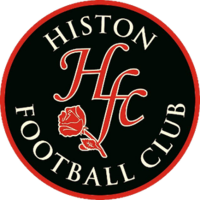 An excursion into Cambridgeshire yesterday brought back a few memories and taking a brisk walk from the Holiday Inn at Histon and Impington, I followed the floodlights, finding myself at an industrial yard and on the new guided bus route which seemed to be obsolete.
An excursion into Cambridgeshire yesterday brought back a few memories and taking a brisk walk from the Holiday Inn at Histon and Impington, I followed the floodlights, finding myself at an industrial yard and on the new guided bus route which seemed to be obsolete.What wasn't dying a death was Histon FC, a club lucky to have flat, fen land fields to play on and a growing population that is encouraged by regional development on valuable roads and rail links to Cambridge, London and the Midlands.
So Histon Village is a thriving settlement and I understand the football club's junior section is full of excited youngsters, male and female. I was there when youngsters were arriving for their Saturday morning matches.
Histon FC was once known as Histon Institute and their nickname is The Stutes. In 1847 the railway arrived and soon a certain John Chivers and Sons family bought a field in the locality to plant orchards and the like, producing jam. In 1870 Chivers' sons set up manufacturing in Bradford and he sent his fruits north on the railway. In 1895, they diversified into Christmas puddings, lemonade, jelly and marmalade and established the first large canning factory in Europe. By 1939 they employed over 3,000 in their business and in the 1960s eighty trains a day passed along the railway. In 1963 a road bypass was built and opened by the Queen Mother.
A local employer days includes the International Whaling Commission and the East of England Development Agency.

Histon FC now play in the Isthmian North. The club has risen from the Cambridgeshire League, East Anglian League during the war, Spartan League (from 1948), Delphian League and into the Athenian in the 1970s when there was "restructuring", East Counties' League 1980s, Southern League, Conference South, Conference National. Exciting times have been known with FA Cup ties in 2008-9 against Swindon Town winning 1-0, making progress in the following round against Leeds 1-0 and finally meeting their match against Swansea City. They also recently failed to get promotion to the Football League, losing to Torquay 1-2 in the play-off.
The local community club is the Hornets and the adult club's best known past players include the "long ball" John Beck, Steve Fallon, David Livermore and Tommy Finney who played for Northern Ireland in the 1982 World Cup. A suitably named Ian Cambridge is their record transfer spend, buying him from Chelmsford for £6,000 in 2000.
No comments:
Post a Comment